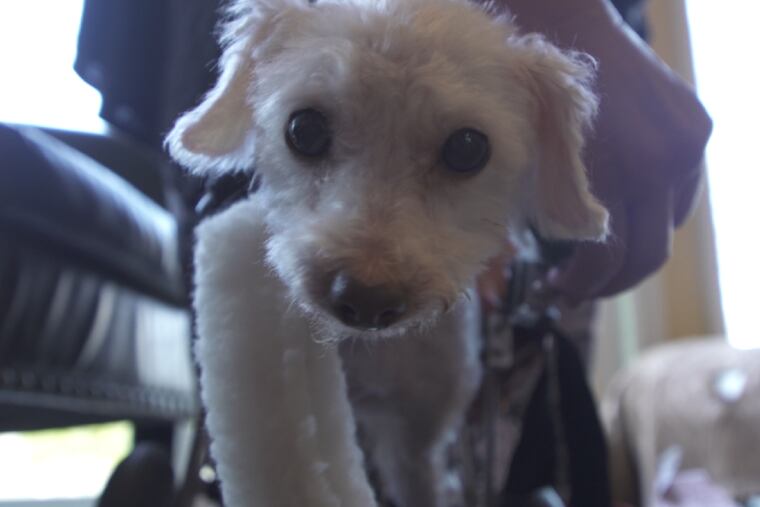Terminally ill dogs come to this unusual hospice to live their best lives
At this unusual dog hospice and sanctuary in rural Burlington County, canine names and needs matter much more than case numbers or prognoses.

The 20 dogs who live at Monkey’s House come in all sizes, colors, temperaments, and terrible terminal ailments.
They have diabetes, heart disease, neurological impairments, or all three; many are in kidney failure, while others have multiple, metastasizing cancers. Some are blind, deaf, or both. And there’s one who is “blind, arthritic, and truly crazy,” said Michele Allen.
“So we named her Crazy Eve.”
At the unusual dog hospice and sanctuary Michele and her husband, Jeff Allen, established in 2015 inside their home in rural Burlington County, canine names and needs matter much more than case numbers or prognoses.
Crazy Eve, Champ, Chase, Hannah, Randy, Shadow, Shark, and the rest of the gang are spending the time they’ve got left by simply being dogs — barking, playing, cuddling, sniffing, and snoozing. As well as enjoying home-cooked food, plenty of belly rubs, and lots of love.
“My vow is for them to have a quality life and a quality death,” says Michele, 55, a retired registered nurse and, like her husband, one of those people who immediately make friends with pretty much everybody.
“When dogs leave us,” Michele said, “they know they’re loved.”
Added Jeff, 62, a technician who maintains HR systems, and also maintains calm despite the canine cacophony: “Monkey’s House is ‘where dogs come to live.’ That’s going to be the title of my book.”
Named for a rescue dog who in Michele’s words “stole everybody’s heart,” the nonprofit Monkey’s House is like Ronald McDonald House without kids. The walls display dozens and dozens of cheerful, family-style photos of beloved residents past and present, images of field trips, visits with Santa, and romps around the picturesque 6-acre grounds.
Monkey’s House isn’t a clinic, kennel, shelter, or commercial boarding facility. It’s a home where everything is free and no one gets paid; much of the $175,000 to $200,000 annual budget is donated. And the time, energy, sweat, and heart everyone pours into the place are priceless.
So was Michele’s being nominated for a CNN Hero award in 2017. The news network’s exhaustive vetting process, and the exposure it continues to generate, have been enormously helpful, the Allens say. So has the Monkey’s House Facebook page, which has more than 65,000 followers.
“I hate to sound woo-woo here, but love goes an awful long way,” said Michele, a lifelong animal person who grew up in Chester Springs. She and Jeff, who hails from Hunterdon County, N.J., have been married for 33 years.
“When you look at a dog who comes to us and is a hot mess, and when the parts of them that work are outnumbered by the parts that don’t, and then you see them after they’ve spent some quality time here, you’ll be amazed what love can do,” said Michele.
The Allens have outfitted their home with customized, dog-friendly furniture and industrial-sized refrigerators filled with treats and high-grade, healthy food. Twice a day, with the help of a spirited cadre of volunteers, they prepare and serve meals tailored to the medical and wellness needs of each animal. They regularly take dogs to local veterinarians and physical therapists and provide the animals with aqua-puncture, Chinese herbs, and other holistic treatments as needed. And twice a day, the dogs get walked, which can be quite a production.
“Just because these dogs [are terminally ill] doesn’t mean they’re going to die right away,” said volunteer Karen Packard, who drives from Warminster once a week and can manage with ease four or five dogs on individual leashes.
“They can have years. If they’re blind, they figure it out and are fine with it. They’re not like people.”
At Monkey’s House, dogs become part of an extended family that embraces their quirks. Dogs who like to be where it’s quieter can hang out in a more private section of the house called “the cottage.” And for dogs with sensitive dermatological issues, which become common with age or illness, there’s the Japanese-made bathing system that uses gentle micro-bubbles in lieu of potentially irritating shampoo. There are also “emergency poop cleanup kits” and a crash cart for cardiac emergencies that Michele calls “Mary Poppins,” so as not to upset anyone.
The Allens carefully screen their dogs and accept only those who get along with other dogs and — at least to some extent — humans. Monkey’s House takes referrals from a network of shelters and rescue organizations in the region and beyond.
Some dogs come with veterinary records, others arrive without even a name: Hence Crazy Eve, ML (for “much loved”) Bob, and Chase (because that’s what he likes doing). Many dogs bear scars and long-festering conditions, attesting to years of neglect or cruelty.
“She was a chain dog. Chained outside for 10 years of her life,” Jeff said, describing Shadow, whose lower left front leg has a chunk of bare skin, forever without fur.
“Shadow is on pain meds, which affect her kidneys and her liver,” said volunteer Terry Flannery, from Cinnaminson. “But she still goes to physical therapy. She’s a ball of fire.”
Even modest stories of transformation — a dog that couldn’t walk taking a step, a severely neurologically impaired dog eagerly offering kisses — help keep Monkey’s House, and the Allens, going.
“My book is going to be all the different dogs and their inspiring stories,” Jeff said.
“We give them the best for the time they have, to make them as healthy as possible, so they can enjoy every moment. It’s a hospice, but it’s where dogs come to live.”
Said Michele: “They have so much love to give.”